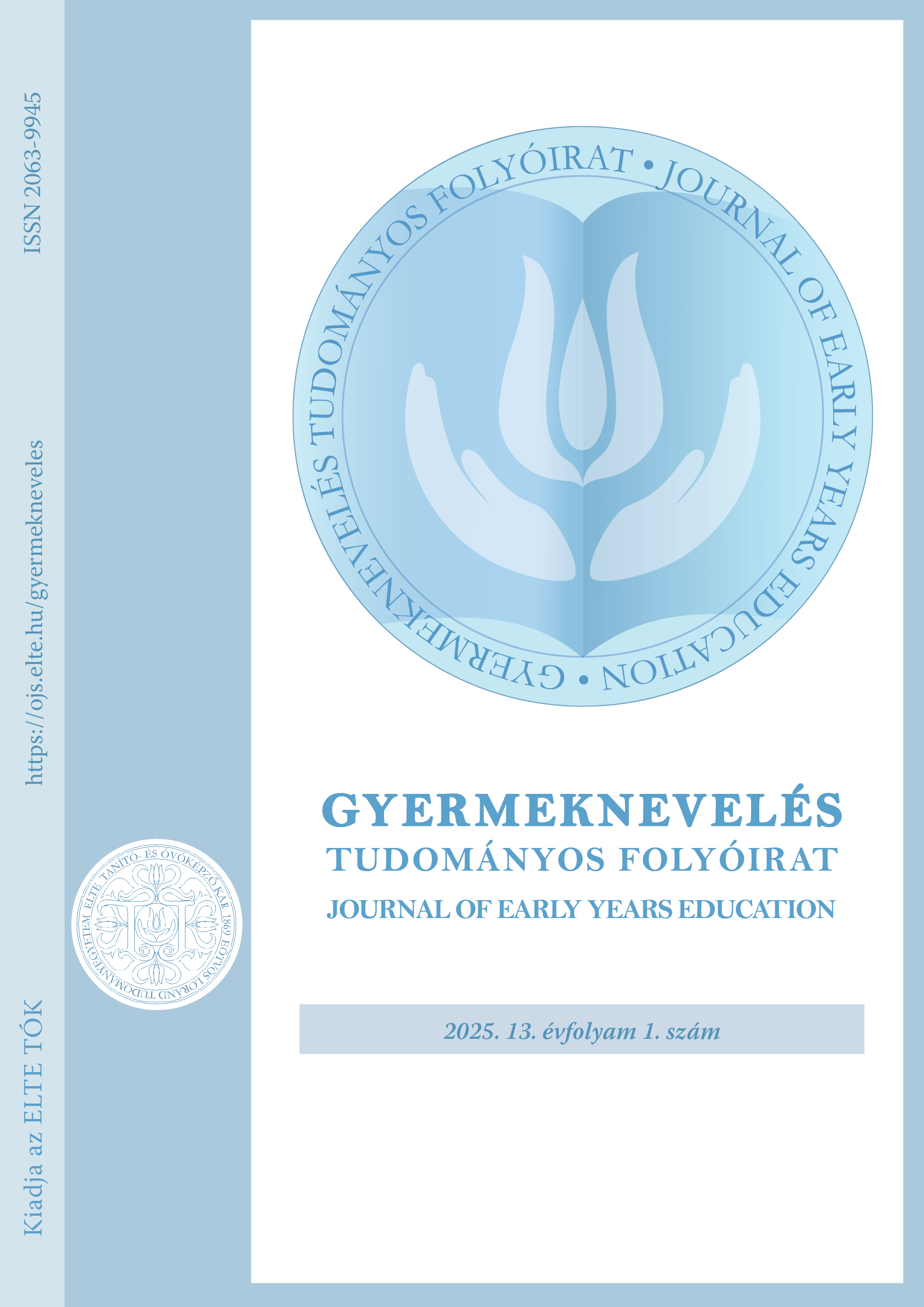The evolution of sustainability education in the light of training and output requirements
DOI:
https://doi.org/10.31074/gyntf.2025.1.127.142Keywords:
teacher training, education, sustainability education, environmental education, higher educationAbstract
For a sustainable future, education must place sustainability at the core of addressing the world’s ever-increasing challenges. Therefore, it is crucial to train teachers (regardless of their specialization) who are well-equipped in this field. To achieve this, it is necessary to understand how sustainability education is positioned within the training system, what role it plays, how it is implemented during training, and what methodological training teachers receive to fulfil their responsibilities in sustainability education. Teacher training faces dual pressures: from teacher shortages and increased workload on the one hand, and the demand for professional development and the implementation of quality education on the other. In the context of quality and efficiency, I investigated the presence of sustainability education within teacher training. Using documentary and contextual analysis, I investigated the changes in regulations concerning the general requirements for teacher training and the training and outcome requirements for individual teacher education programmes, with a focus on sustainability education. In the training of biology, geography, and chemistry teachers, I examined the extent to which the topic of sustainability is integrated into their training. By analysing international and domestic statistical data and utilizing basic statistical indicators, I created comparative tables to evaluate the level of integration of sustainability education within teacher training. Additionally, I analysed the differences and similarities in higher education systems across countries concerning sustainability education.
Downloads
References
/2006. (IV. 3.) OM rendelet az alap- és mesterképzési szakok képzési és kimeneti követelményeiről. https://njt.hu/jogszabaly/2006-15-20-45 (2024.10.30.)
/2016. (VIII. 5.) EMMI rendelet a felsőoktatási szakképzések, az alap- és mesterképzések képzési és kimeneti követelményeiről, valamint a tanári felkészítés közös követelményeiről és az egyes tanárszakok képzési és kimeneti követelményeiről szóló 8/2013. (I. 30.) EMMI rendelet módosításáról. https://njt.hu/jogszabaly/2016-18-20-5H (2024.10.30.)
/2019. (II. 11.) EMMI rendelet a tanári felkészítés közös követelményeiről és az egyes tanárszakok képzési és kimeneti követelményeiről szóló 8/2013. (I. 30.) EMMI rendelet és a felsőoktatási szakképzések, az alap- és mesterképzések képzési és kimeneti követelményeiről, valamint a tanári felkészítés közös követelményeiről és az egyes tanárszakok képzési és kimeneti követelményeiről szóló 8/2013. (I. 30.) EMMI rendelet módosításáról szóló 18/2016. (VIII. 5.) EMMI rendelet módosításáról. https://njt.hu/jogszabaly/2019-3-20-5H (2024.10.30.)
/2021. (XII. 29.) ITM rendelet a tanári felkészítés közös követelményeiről és az egyes tanárszakok képzési és kimeneti követelményeiről szóló 8/2013. (I. 30.) EMMI rendelet, valamint egyes kapcsolódó miniszteri rendeletek módosításáról. https://njt.hu/jogszabaly/2021-64-20-7Q (2024.10.30.)
/2013. (I. 30.) EMMI rendelet a tanári felkészítés közös követelményeiről és az egyes tanárszakok képzési és kimeneti követelményeiről. https://njt.hu/jogszabaly/2013-8-20-5H.7 (2024.10.30.)
Currie, J. & Deschênes, O. (2016). Children and Climate Change: Introducing the Issue. The Future of Children, 26(1), 3–9. https://doi.org/10.1353/foc.2016.0000
Czinkiné Mészáros, K. (2014). A fenntarthatóságra nevelés lehetőségei Verőcén. In Vitályos, G. Á. (Ed.), Fenntarthatóságra nevelés a nevelési-oktatási intézményekben (pp. 125–130). ELTE Tanító-és Óvóképző Kar.
Európai Bizottság (2018). Council Recommendation of 22 May 2018 on Key Competences for Lifelong Learning (Text with EEA relevance). OJC, 189, 04/06/2018, 1–13. https://eur-lex.europa.eu/legal-content/EN/TXT/PDF/?uri=CELEX:32018H0604(01)&qid=1736165075449 (2024.10.30.)
Evans, N.S., Inwood, H., Christie, B. & Ärlemalm-Hagsér, E. (2021). Comparing education for sustainable development in initial teacher education across four countries. International Journal of Sustainability in Higher Education, 22(6) 1351–1372. https://doi.org/10.1108/IJSHE-07-2020-0254
Havas P., Széplaki N. & Varga A. (2004). A környezeti nevelés magyarországi gyakorlata. Új Pedagógiai Szemle, 1, 12–15.
Homoki, E., Sütő, L. & Mika, J. (2017). A Fenntartható Fejlődési Célok (2016–2030) hasznosítása a földrajz felsőoktatásban. In Fodorné Tóth, K. (Ed.), Felsőoktatás, életen át tartó tanulás és az ENSZ fenntartható fejlesztési célok megvalósítása. Higher Education, Lifelong Learning and Implementation of UN Sustainable Development Goals (pp. 66–79). MELLearN Egyesület.
Kertész, Á. (2010). A környezeti nevelés lehetőségei egy általános iskolában. Szakdolgozat. Miskolci Egyetem Gazdaságtudományi Kar. http://www.szervez.uni-miskolc.hu/blaci/blaci/otka/tudas/szd1.pdf (2023. 12. 18)
Leicht, A., Heiss, J. & Byun, W. J. (2018, Eds.). Issues and trends in education for sustainable development. UNESCO Publishing. https://doi.org/10.54675/YELO2332
Molnár, L. (2020). A fenntarthatóságra nevelés az egyetemi oktatásban. Oktatási és Környezetvédelmi Tanulmányok, 22(3), 123–134.
Nguyen, A. N., Nguyen, T. P., Kieu, K. T., Nguyen, Y. T. H., Dang, D. T., Singer, J., Schruefer, G., Tran, T. B. & Lambrechts, W. (2022). Assessing teacher training programs for the prevalence of sustainability in learning outcomes, learning content and didactic approaches. Journal of Cleaner Production, 365, 132–786. https://doi.org/10.1016/j.jclepro.2022.132786
Olsson, D. & Gericke, N. (2015). The adolescent dip in students’ sustainability consciousness — Implications for education for sustainable development. The Journal of Environmental Education, 47(1), 35–51. https://doi.org/10.1080/00958964.2015.1075464
Panneerselvam, M. & Muthamizhselvan, M (2015). The Secondary School students Inrelation To Scientific Attitude And Achievement In Science. IOSR Journal of Research & Method in Education 5(2), 5–8. https://doi.org/10.9790/7388-05230107
Szivák, J., Fazekas, Á., Horváth, L., Tóth, Á. N. & Salát, M. (2019). A pedagógusok szakmai tanulásának támogatása a hazai szabályozást segítő dokumentumokban. Pedagógusképzés, 18(3–4), 25–45. https://doi.org/10.37205/TEL-hun.2019.3-4.02
UNESCO. (2017). Education for sustainable development goals: Learning objectives. UNESCO. https://doi.org/10.54675/CGBA9153
UNESCO. (2020). Education for Sustainable Development: A Road Map. UNESCO. https://doi.org/10.54675/YFRE1448
UNESCO. (2021). International Standard Classification of Teacher Training Programmes: ISCED-T 2021. UNESCO Institute for Statistics. https://unesdoc.unesco.org/ark:/48223/pf0000379750.
VERBI Software. (2023). MAXQDA 2024 [Computer software]. VERBI Software. https://www.maxqda.com
Downloads
Published
How to Cite
Issue
Section
License
Copyright (c) 2025 Author

This work is licensed under a Creative Commons Attribution-NonCommercial-ShareAlike 4.0 International License.

